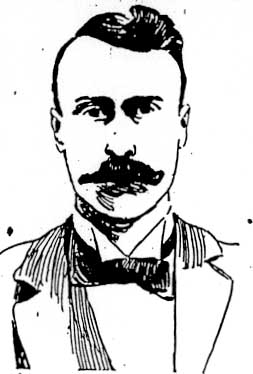
READ CHAPTER 1
GALLERY
WHO'S WHO
ATLAS
MYTHS DEBUNKED
FAMILY TREE
CONTACT THE AUTHOR
UPCOMING EVENTS
REVIEWS
CHICAGO HISTORY LINKS
READING SUGGESTIONS
BUY THIS BOOK
Cook County Jailer John L. Whitman

At Sterling, Ill., situated some 110 miles west of the city of Chicago, in the peaceful St. Lawrence valley, some forty years before the dawn of the twentieth century, on the 23rd day of July, 1862, in a lonely cottage standing on the churchyard with all becoming piety, in fact, the parsonage of the Baptist Church, at the end of a strangely cool day for that season of the year, just as midnight bade the coming day farewell and passed into the oblivion of eternal time, without prediction from the Wise Men of the Desert or any other ceremony save the song of the rustling leaves and sleeping flowers, just as the moonbeams playfully turned darkness into daylight, was born John L. Whitman.
[He became a guard on December 1, 1890] ...and thus entered this Son of Destiny on his life’s work as a teacher...
As a jail guard he was a revelation. He spoke to prisoners in kindness, in sympathy, and placed himself on the same plane with them and aimed to make them as comfortable as their unhappy lots in life permitted. Other guards were gruff, spoke in anger, and at times were brutal... His fellow guards could not understand him. First they wondered, then they pitied, for they thought he was insane to treat prisoners as his equal.
[He was appointed the head jailer on May 1, 1895.]
Calling his guards together he said, "Although Jailer, I can accomplish little good without the united assistance of all my guards; they are just as necessary to the success of my ideas in the management of this jail as my own acts, and I want you all to know and feel that I am not managing this jail alone, but that we all are doing our share, and together we make up the whole. Always keep in mind that kindness is the key to all human hearts, and sympathy the password to good fellowship. Men imprisoned here are human and are entitled to every consideration they can, consistently, receive at our hands. Never strike a blow, never abuse an inmate, rather give him a kind word, a little sympathy, and the necessity for harsh treatment will soon vanish. Get the men to believe that you are their friends and not their natural enemies, and that you are here merely to do a plain duty as kindly as it can be done. When you have done this you will have done everything."
This was a mighty task, this assembling 600 men, some notorious criminals, in the corridors in the jail and permitting them to give vent to their feelings in applause, or otherwise, at the kind of amusement offered them...
A performance was concluded, the Jailer stepped onto the stage. "Now, boys, give three cheers for those who helped entertain you today," he said — all was silent—they could not understand — were they to be allowed to give vent to their feelings just as freemen — they hesitated — another look at the kindly face of the Jailer unloosened their shackles, and three cheers were given as never heard before. "Three cheers for Mr. Whitman," cried one of them and the prison walls shook with the mighty roar that went up from these men whose hearts were softened by the milk of human kindness.
— Anonymous, Origin of The John L. Whitman Moral Improvement Association of the Cook County Jail, The Revelation of a Divine Truth By A Prisoner. (1901.)
Picture: Chicago Tribune, Nov. 28, 1897.